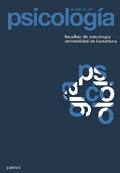The displaced construction of people-place bonds: a theoretical review
Abstract
One of the issues that environmental psychology has explored is the study of the meaningful bonds that people have with places. Previous studies have focused mainly on the relationship with socio-physical settings, both fixed and materially available for the person (dwelling, neighbourhood, city). However, the current possibilities of mobility, displacement and minimization of distances defining contemporary so cieties underpin particular situations that challenge this static and material conception of people-place bonds. This paper presents a theoretical overview of the approaches within the discipline that can contribute to the exploration of people-place bonding processes under conditions of displacement or dislocation. Studies concerned with cognitive generalization devices, symbolic ties and linguistic-discursive constructions appear to be useful approaches, and invite us to reflect on the contemporary role of place in the processes of the constitution of subjectivity. Key words: environmental psychology, displacement, place, appropriation, attachment.Downloads
Published
2009-02-12
Issue
Section
Articles
License
The authors who publish in this journal agree to the following terms:
Authors transfer to the publisher all copyright for the full term of protection and for all the world.
The authors can post a copy of their articles in accordance with the policy of free access to the journal.


